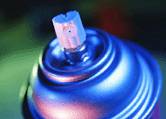
THURSDAY, March 11 (HealthDay News) — More 12-year-olds have used inhalants to get high than marijuana, cocaine and hallucinogens combined, a new report finds.
These potentially deadly inhalants include aerosol computer cleaners, glue, hair sprays, paint solvents and gasoline. They’re “huffed” or sniffed and can cause addiction or sudden death from cardiac arrest.
The U.S. Substance Abuse and Mental Health Services Administration reported on statistics from 2006-2008 national surveys. They show that almost seven percent of 12-year-olds report sniffing inhalants, compared to 1.4 percent who say they’ve used marijuana, 0.7 percent who’ve used hallucinogens, and 0.1 percent who’ve used cocaine. About five percent reported using prescription drugs for non-medical reasons.
At a press conference held this week on the issue, 17-year-old Ashley Upchurch, a recovering inhalant abuser, said the habit can take a debilitating toll.
“Inhalants were a cheap, legal, and an intense high that would also enhance the feeling I would get from other drugs,” she said. “These highs nearly destroyed my life.”
More must be done to stem inhalant use nationwide, experts said.
“With data showing that young people often don’t perceive the great risk of abusing inhalants, we must redouble our efforts to inform adolescents of the dangers and to encourage parents to be more vigilant in protecting their children from inhalants often present in common household products,” said Gil Kerlikowske, director of national drug control policy, in a statement.
More information
The U.S. National Institute on Drug Abuse has more details on inhalants.

